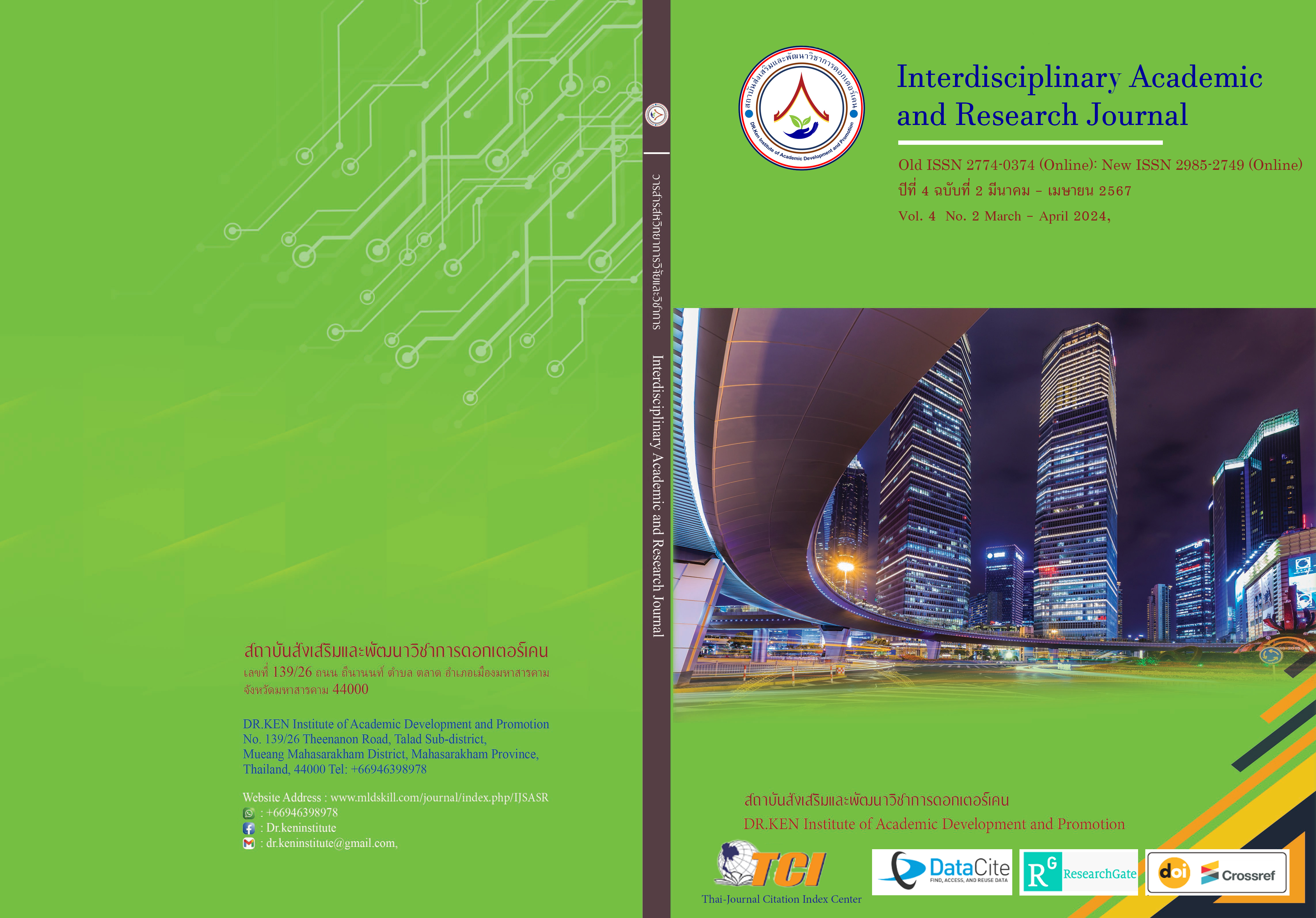A Study of Learning Achievement on Ecosystem Adventure Worldwide Learning Unit and Scientific Mind of the Grade 9 Students Using Science, Technology, Society and Environment Approach (STSE)
DOI:
https://doi.org/10.60027/iarj.2024.274006Keywords:
Science Technology, Society and Environment Approach; , Learning achievement; , Scientific mindAbstract
Background and Aims: The Science, Technology, Society, and Environment Approach (STSE) is important in encouraging students to able to learn including integrating learning about science into daily life environment and it will lead to presenting the way to fix the problem by connecting between science, technology, society, and environment. The purposes of this study were to 1) compare grade 9 students learning achievement before and after learning using Science, Technology, Society and Environment Approach, 2) compare grade 9 students’ learning achievement after learning using Science, Technology, Society and Environment Approach with a criterion of 70 percent, and 3) compare the scientific mind of grade 9 students before and after learning using Science, Technology, Society and Environment Approach.
Methodology: The sample group of this study was 18 grade 9 students in the second academic year of 2023 at Phupra Witthayokhom School. The sample was selected using cluster random sampling. The research instruments were lesson plans based on the Science, Technology, Society, and Environment Approach, achievement tests and Scientific Mind questionnaires. The data were statistically analyzed by percentage, mean, Standard Deviation, t-test, and Kolmogorov-Smirnov test.
Results: The findings of this research were as follows: 1) Learning achievement of grade 9 students after using the Science, Technology, Society, and Environment Approach was significantly higher than before learning at the .05 level. 2) The learning achievement of grade 9 students after using the Science, Technology, Society and Environment Approach was not significantly higher than the 70% criterion at the .05 level. and 3) The Scientific mind of grade 9 students after using the Science, Technology, Society, and Environment Approach was significantly higher than before learning including overall and each part at the .05 level.
Conclusion: The study reveals that the implementation of a learning approach based on the principles of science, technology, society, and environment significantly enhances the academic performance of third-year high school students. A statistically significant increase in learning outcomes is observed in various subjects, including adventure learning related to environmental systems. Overall, the findings underscore the positive impact of incorporating scientific, technological, social, and environmental perspectives into the curriculum, contributing to improved academic achievements among third-year high school students.
References
กนกกร ทองน้อย และนวลจิตต์ เชาวกีรติพงศ์. (2565). ผลการจัดการเรียนรู้ตามแนวคิดวิทยาศาสตร์ เทคโนโลยี สังคม และสิ่งแวดล้อม เรื่องปรากฏการณ์ทางธรรมชาติและธรณีพิบัติภัย ที่มีต่อผลสัมฤทธิ์ทางการเรียนวิทยาศาสตร์ และความสามารถในการคิดวิเคราะห์ของนักเรียนชั้นประถมศึกษาปีที่ 6 โรงเรียนสาธิตมหาวิทยาลัยราชภัฏนครสวรรค์. Journal of Roi Kaensarn Academi. 7(12), 213-214.
กระทรวงศึกษาธิการ. (2551). หลักสูตรแกนกลางการศึกษาขั้นพื้นฐานพุทธศักราช 2551. กรุงเทพฯ: กระทรวงศึกษาธิการ.
กิติพงษ์ ลือนาม. (2561). การวิจัยทางการศึกษา. นครราชสีมา: คณะครุศาสตร์มหาวิทยาลัยราชภัฏนครราชสีมา.
ดวงใจ บุตรหนองแสง และสมบูรณ์ ตันยะ. (2560). การศึกษาผลสัมฤทธิ์ทางการเรียนหน่วยการเรียนรู้สารชีวโมเลกุลและความสามารถในการคิดวิเคราะห์ของนักเรียนชั้นมัธยมศึกษาปีที่ 4 จากการจัดการเรียนรู้แบบวัฏจักรการสืบเสาะหาความรู้ร่วมกับเทคนิคแผนผังความคิด. วารสารชุมชนวิจัย มหาวิทยาลัยราชภัฏนครราชสีมา. 11(3), 53-66.
ดวงสมร อ่องแสงคุณ. (2564). การพัฒนาสื่อมัลติมีเดียตามแนวคิดวิทยาศาสตร์ เทคโนโลยีสังคมและสิ่งแวดล้อม บูรณาการสาระท้องถิ่น เรื่อง นาเกลือสมุทรสาคร เพื่อส่งเสริมความสามารถในการคิดวิเคราะห์และจิตวิทยาศาสตร์ ของนักเรียนชั้นประถมศึกษาปีที่5 โรงเรียนวัดโสภณาราม(ปลั่งร่วมราษฎร์บำรุง). คุรุสภาวิทยาจารย์. 2(3), 15-26.
ปัณฑิตา กรรณิการ์. (2562). การพัฒนาการรู้วิทยาศาสตร์ของนักเรียนมัธยมศึกษาปี ที่ 5 รายวิชาชีววิทยา เรื่อง การสืบพันธุ์ของพืชดอก โดยใช้การจัดการเรียนรู้ตามแนวคิดวิทยาศาสตร์ เทคโนโลยี สังคมและสิ่งแวดล้อม. วิทยานิพนธ์มหาบัณฑิต : มหาวิทยาลัยรังสิต.
พัชรินทร์ บัวสิน, และกนกพร ฉายะบุระกุล. (2561). ผลของการจัดการเรียนรู้ ตามแนวคิดวิทยาศาสตร์ เทคโนโลยี สังคม และสิ่งแวดล้อม ที่มีต่อความคิดสร้างสรรค์ทางวิทยาศาสตร์ ของนักเรียนชั้นมัธยมศึกษาปีที่ 5 ในรายวิชาชีววิทยา เรื่อง การสืบพันธุ์พืชดอก. วิทยานิพนธ์ศิลปศาสตรมหาบัณฑิต : มหาวิทยาลัยรังสิต.
พันธ์ ทองชุมนุม. (2547). การสอนวิทยาศาสตร์ระดับประถมศึกษา. กรุงเทพฯ : โอเดียนสโตร์.
โรงเรียนภูพระวิทยาคม. (2562). หลักสูตรสถานศึกษา. ชัยภูมิ: สำนักงานเขตพื้นที่การศึกษามัธยมศึกษาชัยภูมิ.
วิจารณ์ พานิช. (2555). วิถีสร้างการเรียนรู้เพื่อศิษย์ในศตวรรษที่ 21. กรุงเทพฯ: ตถาตาพับลิเคชั่น.
สถาบันส่งเสริมการสอนวิทยาศาสตร์และเทคโนโลยี. (2555). การวัดผลประเมินผลวิทยาศาสตร์. กรุงเทพฯ : สถาบันส่งเสริมการสอนวิทยาศาสตร์และเทคโนโลยี.
สถาบันส่งเสริมการสอนวิทยาศาสตร์และเทคโนโลยี. (2561). คู่มือการใช้หลักสูตรรายวิชาพื้นฐานวิทยาศาสตร์ กลุ่มสาระการเรียนรู้ วิทยาศาสตร์ (ฉบับปรับปรุง พ.ศ.2560) ตามหลักสูตรแกนกลางการศึกษาขั้นพื้นฐาน พุทธศักราช 2551 ระดับมัธยมศึกษาตอนต้น. Retrieved on 20 November 2022, from: http://scimath.org/e-books/8923/flippingbook/index.html
สำนักงานคณะกรรมการการศึกษาขั้นพื้นฐาน. (2553). คู่มือการพัฒนาหลักสูตรและการสอน. กรุงเทพฯ: สำนักบริหารงานการมัธยมศึกษาตอนปลาย.
สุนันท์ สีพาย. (2564) การพัฒนาเครื่องมือรวบรวมข้อมูลการวิจัยทางการศึกษา. ชัยภูมิ : คณะครุศาสตร์ มหาวิทยาลัยราชภัฏชัยภูมิ.
อรรญา จุ้ยนคร, ดวงเดือน สุวรรณจินดา, และทวีศักดิ์ จินดานุรักษ์. (2561). ผลการจัดการเรียนรู้ตามแนวคิด วิทยาศาสตร์ เทคโนโลยี สังคม และสิ่งแวดล้อม เรื่อง ทรัพยากรธรณี ที่มีต่อผลสัมฤทธิ์ทางการเรียนวิทยาศาสตร์และความสามารถในการแก้ปัญหา ของนักเรียนชั้นมัธยมศึกษาปีที่ 2 โรงเรียนพระแสงวิทยา จังหวัดสุราษฎร์ธานี. การประชุมเสนอผลงานวิจัยระดับชาติ มหาวิทยาลัยสุโขทัยธรรมาธิราช ครั้งที่ 8, วันที่ 23 พฤศจิกายน 2561 ณ อาคารเฉลิมพระเกียรติ 80 พรรษา 5 ธันวาคม 2550. นนทบุรี :มหาวิทยาลัยสุโขทัยธรรมาธิราช.
Aikenhead, G. (1996). Consequences to Learning Science Through STS: STS Education. New York: Teacher College Press.
Budi.A P S., Sunarno .W., & Sugiyarto. (2018). Natural science modules with SETS approach to improve students’ critical thinking ability. Journal of Physics: Conference Series; Bristol, 1022(1), 1-9.
Carin, A. (1997). Teaching Modern Science. 7th ed., New Jersey: Prentice-Hall.
Fraser BJ. (1978). Development of a test of science-related attitude. Science education, 62(4), 509 - 515.
Gresch, H., Hasselhorn, M., & Bogenholz, S. (2015). Enhancing Decision-Making in STSE Education by Inducing Reflection and Self-Regulated Learning. Research in Science Education, 47(1), 95-118.
Klaynin, S. (2012). The science education in Thailand: developing and deterioration. Samutprakarn: Advance printing service.
Novi, M., Hasanuddin, H., & Cut, N. (2017). The effect of Science, Technology, Society, Environment (STSE) Model in Critical Thinking Skill and Student Achievement in Matter Environmental Pollution at MAS JEUMALA ‘AMAL. Jurnal EduBio Tropika, 5(1), 1-53.
Nuray,Y., Inci,M., & Nilgun,S. (2009). The effects of science, technology, society and environment (STSE) education on students’career planning (online). Retrieved January 15, 2023, from: http://www.eric.ed.gov/ERICDocs/data/ericdocs2sql/content_storage_01/0000.html
Pedretti, E. (2005). STSE education: Principles and practices. in Aslop S., Bencze L., Pedretti E. (eds.) Analyzing exemplary science teaching: Theoretical lenses and a spectrum of possibilities for practice Maidenhead. Open University, McGraw-Hill Education.
Richardson, G., & Blades, D. (2000). Social studies and science education: Developing world citizenship through interdisciplinary partnerships. Canada’s National Social Studies Journal, 35(3), 10-22.
Rika, U., Abdul, H., & Hafnati,R. (2019). Science Environmental Technology and Society-based Module Development on Petroleum Chemistry to Enhance Student Learning Achievement. Journal of Innovation in Science and Mathematics, 7(2), 2347–9051.
Robert, E.Y. (2007). STS Requires Changes in Teaching. SAGE Journals, 27(5), 386-390.
Downloads
Published
How to Cite
Issue
Section
License
Copyright (c) 2024 Interdisciplinary Academic and Research Journal

This work is licensed under a Creative Commons Attribution-NonCommercial-NoDerivatives 4.0 International License.
Copyright on any article in the Interdisciplinary Academic and Research Journal is retained by the author(s) under the under the Creative Commons Attribution-NonCommercial-NoDerivatives 4.0 International License. Permission to use text, content, images, etc. of publication. Any user to read, download, copy, distribute, print, search, or link to the full texts of articles, crawl them for indexing, pass them as data to software, or use them for any other lawful purpose. But do not use it for commercial use or with the intent to benefit any business.
















.png)


